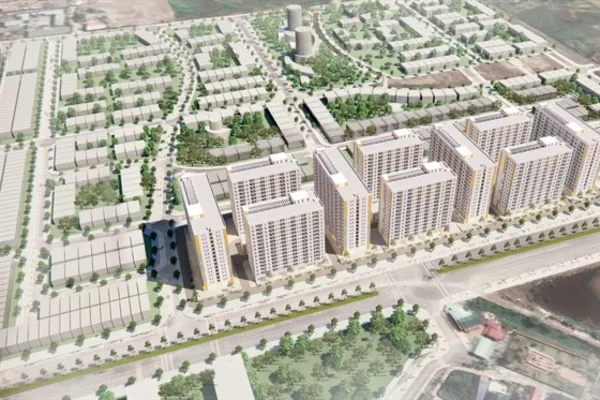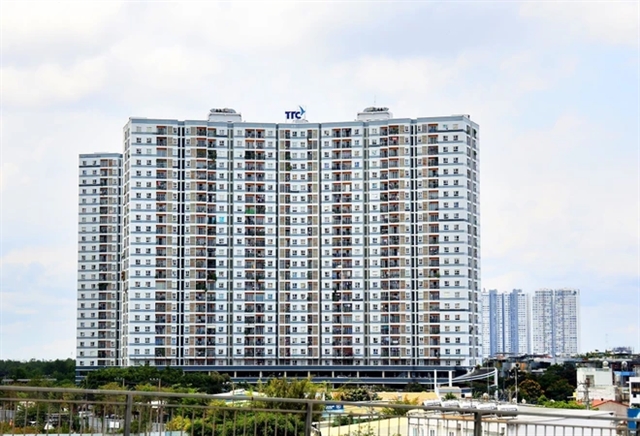 Society
Society

 |
| A social housing project in HCM City. Localities across the country are focusing on social housing development as part of a national strategy to meet the growing needs of their residents. VNA/VNS Photo |
HCM CITY — Cities and provinces across the country are focusing on social housing development as part of a national strategy to meet the growing needs of their residents.
Major cities, including Hà Nội and HCM City, are making this a priority under the national programme “Investment in building at least one million social housing apartments for low-income people and industrial park workers in the period 2021-30.”
By 2025, the programme plans to add 428,000 apartments and an additional 634,000 by 2030.
Among the localities, Hà Nội and HCM City, with their ever-growing population and limited space, have been at the forefront of this initiative.
Võ Nguyên Phong, director of the Hà Nội Department of Construction, said Hà Nội had a housing development plan focused on constructing 1.215 million square metres of social housing by 2025.
The plan’s aims include the development of 63 projects with around 61,900 apartments, and five projects with 5,200 units that have already been completed, according to Phong.
However, Hà Nội is facing obstacles in developing social housing, particularly with regard to investment procedures and incentive mechanisms.
In addition, HCM City has been investing in various housing projects to accommodate the needs of its residents, particularly workers who are struggling to afford housing.
The country’s largest city aims to build 35,000 social housing units with 2.5 million square metres of floor space by 2025.
By 2025, around 7,000 apartments with 500,000 square metres will be leased, and 4,500 units with 220,000 square metres will be sold to workers.
HCM City plans to develop approximately 15.5 million square metres of floor space for social housing by 2025, and 21.4 million square metres of floor space for commercial housing by 2030.
By 2030, an additional 31.9 million square metres of floor space for separate houses for households will be completed.
Similarly, HCM City has been facing multiple challenges in developing social housing such as complex investment procedures and hurdles related to land use and land allocation.
The city plans to spend about VNĐ3.8 trillion ($160 million) for social housing by 2025, and VNĐ8.6 trillion ($367 million) for social housing by 2030.
Statistics of the Ministry of Construction showed that currently 28 provinces have announced 68 projects eligible for loans under a VNĐ120 trillion ($4.8 billion) credit programme.
Six housing projects in five localities have been disbursed capital of about VNĐ415 billion ($16.8 million).
Notably, more than 8,300ha of land across the country has been planned for social housing.
Thus, compared to 2020 (3,359ha), the area of land for social housing increased.
Some localities are interested in planning land funds for social housing development such as Đồng Nai (1,063ha), HCM City (608ha), Long An (577ha), Hải Phòng (471ha) and Hà Nội (412ha).
Experts have pointed out that there are hurdles for firms investing in social housing related to accessing land, construction investment procedures, credit and preferential policies.
Nguyễn Văn Sinh, deputy minister of construction, said the ministry had been working with cities and provinces, as well as related agencies, to address policy and mechanism issues.
Many of these issues had been resolved through the recent amendments to the Land Law and Housing Law passed by the National Assembly, he added.
Trần Hồng Hà, deputy prime minister, said all localities must review planning, land fund arrangement and administrative procedure reform to promote social housing development.
Last year, the Government received the National Assembly’s approval for the Law on Housing and the amended Law on Land, along with many related legal documents, which have removed a number of obstacles for social housing for workers.
As of 2021, 499 social housing projects have been implemented nationwide, providing more than 411,000 apartments, of which 71 projects have been completed with nearly 40,000 apartments. — VNS